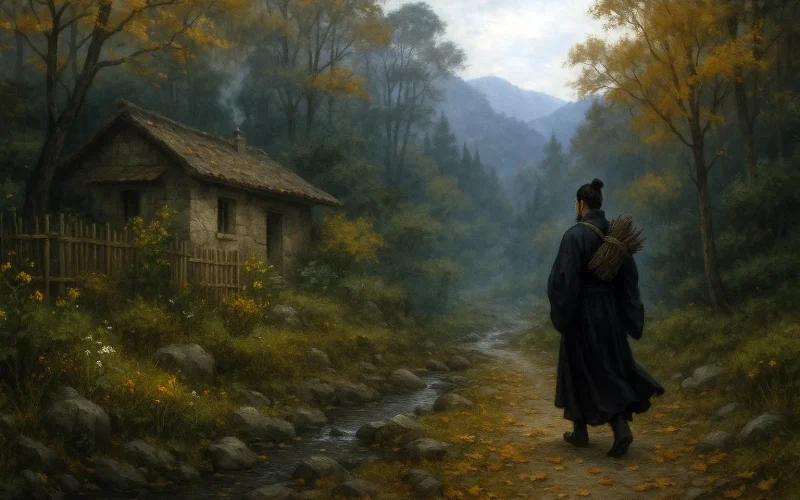Furling my sail near the town of Huai,
I find for harbour a little cove
Where a sudden breeze whips up the waves.
The sun is growing dim now and sinks in the dusk.
People are coming home. The bright mountain-peak darkens.
Wildgeese fly down to an island of white weeds.
…At midnight I think of a northern city-gate,
And I hear a bell tolling between me and sleep.
Original Poem
「夕次盱眙县」
韦应物
落帆逗淮镇,停舫临孤驿。
浩浩风起波,冥冥日沈夕。
人归山郭暗,雁下芦洲白。
独夜忆秦关,听钟未眠客。
Interpretation
Composed during Wei Yingwu's journey to assume the governorship of Suzhou, this poem captures an evening stopover at XuYi county by the Huai River. Facing the vast, silent twilight landscape, the poet's profound homesickness emerges through meticulous descriptions of travel scenes, seamlessly blending journey's solitude with nostalgia in a resonant fusion of emotion and scenery.
First Couplet: "落帆逗淮镇,停舫临孤驿。"
Luò fān dòu huái zhèn, tíng fǎng lín gū yì.
Sails lowered at Huai's riverside town; My boat moors by a lonesome station's ground.
The opening establishes geographical and emotional coordinates—"lonesome station" (孤驿) reflects both desolate surroundings and the poet's solitary state, naturally transitioning from scene to sentiment.
Second Couplet: "浩浩风起波,冥冥日沈夕。"
Hàohào fēng qǐ bō, míngmíng rì chén xī.
Winds whip vast waves across the stream; The dimming sun sinks in dusk's gleam.
Expansive imagery of wind-roughened waters and fading light embodies the journey's melancholy, with "dimming" (冥冥) visually conveying emotional uncertainty.
Third Couplet: "人归山郭暗,雁下芦洲白。"
Rén guī shān guō àn, yàn xià lú zhōu bái.
Villagers return to darkened hills; Geese descend on reed-isles white as rills.
Human and avian homecomings ("return"/"descend") contrast with the poet's rootlessness, while "white reeds" (芦洲白) intensify the visual loneliness against gathering darkness.
Fourth Couplet: "独夜忆秦关,听钟未眠客。"
Dú yè yì qín guān, tīng zhōng wèi mián kè.
Alone, I long for Chang'an's gate; Temple bells toll for this sleepless mate.
The conclusive "sleepless mate" (未眠客) personalizes the journey's isolation, where distant bells amplify rather than soothe homesickness, merging physical and emotional wandering.
Artistic Features
The poem threads solitude through "lonesome station," "dimming light," and "darkened hills"—each image deepening emotional desolation. Its unadorned language achieves rich subtleties, progressing naturally from distant views to intimate insomnia. The structural movement from mooring to memories demonstrates Wei's mastery of scene-to-sentiment transitions.
Holistic Appreciation
Employing plain description (白描), the poem builds profound desolation from simple elements: moored boat (1), windswept dusk (2), returning creatures (3), and ultimately the poet's wakeful nostalgia (4). Without explicit sorrow, each couplet accumulates emotional weight—the villagers' homeward paths and geese's nesting contrasting the speaker's suspended journey. The concluding temple bells resonate as both temporal markers and metaphors for unreachable homelands.
Insight
Wei transforms a routine stopover into existential meditation. The "white reed-isles" represent transient resting places in life's journey, while "Chang'an's gate" symbolizes permanent belonging. This Tang masterpiece suggests that travel's deepest loneliness emerges not during movement, but in stillness—when others' rootedness highlights our own displacement.
Poem translator
Kiang Kanghu
About the poet

Wei Yingwu (韦应物), circa 737 - 786, was a native of Chang'an, Beijing. His poems were collected in the Wei Suzhou Collection, which included poems concerned with the plight of the people, expressions of disobedience to the times and indignation against the world, and descriptions of idyllic landscapes, etc., of which the ones describing idyllic landscapes are the most famous, and have been sung by posterity in particular.












